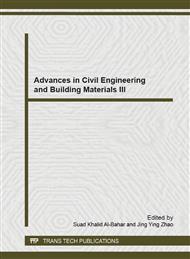p.3
p.9
p.14
p.18
p.23
p.27
p.32
p.36
p.40
Chloride Resistance of Concrete with Marine Blended Cement Using Corrosion Resistant Mineral Admixture
Abstract:
In this study, the chloride resistant properties of concrete with MBC (marine blended cement) were evaluated by an accelerated corrosion test of reinforced concrete. The half-cell potential measurements indicated that the chloride resistance of MBC concrete is approximately 32% larger than that of TBC (ternary blended cement) concrete. As for the reinforcement corrosion area, while the TBC specimens exhibited 5.32-6.11% corrosion at the final 40th cycle, the MBC specimens did not show any sign of steel corrosion. The chloride penetration depth of the MBC specimens was approximately 41-79% smaller than that of the MBC specimens.
Info:
Periodical:
Pages:
23-26
DOI:
Citation:
Online since:
December 2013
Authors:
Price:
Сopyright:
© 2014 Trans Tech Publications Ltd. All Rights Reserved
Share:
Citation:


